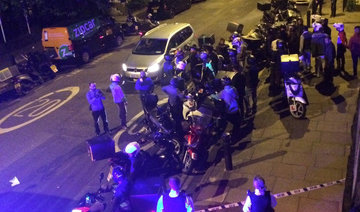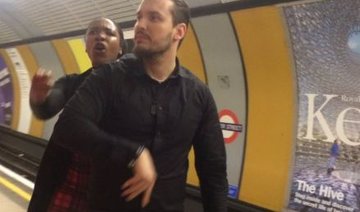LONDON: From the Westminster and London Bridge terror attacks to acid-wielding gangs, the city’s usual summer cheer is tinged with fear. Londoners are under siege.
On a balmy Sunday morning in July, Hyde Park in the center of the UK capital is in bloom and bustling with tourists enjoying the sunshine.
But in the boroughs beyond is a city deeply divided — by money, politics and religion.
The diversity, tolerance and good humor that once defined the UK capital are being shouted down.
At Speakers’ Corner, where public speakers have gathered since 1872, the shouting is being done by rival preachers of Christian and Muslim faiths.
They trade insults for the entertainment of the crowd — like boxers trash-talking before a bout.
Among the audience is Londoner Mercyn Botayi, who sees fear and inequality in many aspects of his home city — from the social deprivation revealed by the Grenfell Tower fire to the backlash against Muslims in the wake of a string of terror attacks in the capital.
“Islamophobia has become really real,” said the 18-year-old student, who is not himself a Muslim. “There is a typification of Muslims and I don’t understand where it comes from. People see Muslims and they think terrorists.”
Police figures point to a rise in hate crimes as well as those specifically targeting Muslims this summer.
The Metropolitan Police has increased its number of specialist investigators dealing with hate crimes by 30 percent over the last two years, with 900 members of staff now dedicated to this type of offense.
The Mayor of London’s office last month released figures that showed a sharp increase in hate crimes and Islamaphobic incidents in the aftermath of the London Bridge terror attack on June 3. Racist incidents leapt by as much as 40 percent.
Some have contrasted how the media covered the London Bridge attack to coverage of other incidents, such as the van attack on Muslims near Finsbury Park Mosque in June.
“The Finsbury Park attack was (allegedly) done by a white guy but they didn’t call him a terrorist. Had he been an Asian he would have been called a terrorist,” said Botayi.
His friend Simeon Mitchell, an 18-year-old student, agrees that the media has played a part in stoking such divisions and helping to tribalize a city world-famous for its tolerance.
Some commentators trace London’s changing temperament to last summer when Britain voted narrowly to leave the EU.
The vitriolic political language unleashed by Brexit is not just finding its voice in the city’s underclass estates or atop the angry soap boxes of Speakers’ Corner, but also among the highest rungs of society — as the jailing of aristocrat Rhodri Philipps this month highlighted.
The polo-playing viscount received a 12-week sentence for a string of menacing social media posts. One of them offered £5,000 for someone to “accidentally” run over anti-Brexit campaigner Gina Miller.
“If this is what we should expect from immigrants send them back to their stinking jungles,” he wrote in a post that he later claimed was “just satire.”
Mike Ainsworth, a director at Stop Hate UK, sees a clear link between the rise of hate crimes and the EU membership referendum.
He said that while there was nothing intrinsic in Brexit that should have encouraged more hate crimes, the rhetoric used by politicians and reported by a media that deliberately sought comment from individuals known for their extreme views, produced the same practical result.
“The relationship between hate speech and hate crime is absolute,” he said.The efficiency of social media in framing the narrative after a terror incident means that political leaders need to be equally swift in delivering messages that do not stoke up the potential for further hate crimes.
“We also tend to interact with people on social media who agree with us,” said Ainsworth. “The perpetrators of hate crime often say they never heard of the counter narrative until they were arrested.”
Rising wealth disparity in the capital could also be fueling tension.
The gulf between the city’s rich and poor — so vividly revealed by the Grenfell Tower fire in June, in which at least 80 people perished — is getting wider.
Grenfell Tower, which was home to many immigrants working on or below the poverty line, is located in a borough where the average terraced house sells for almost £4.3 million ($5.6 million), according to the Rightmove property listings website.”If you look at Grenfell, you can see the division in society,” says Botayi. “In a middle-class area there would never be a tower block with that cladding.”
Squalor and splendor have long lived cheek by jowl in London, back to the best and worst of Dickensian times.
But a rampant housing boom that is only now cooling has extended and distended that inequality by sucking a disproportionately large proportion of many people’s wages into paying rent — while many others fortunate enough to own their homes have become paper millionaires.
In a city where the average price of a home is now more than £630,000, some 27 percent of Londoners live in poverty after housing costs are taken into account, according to the New Policy Institute.
Almost 700,000 jobs in London (18 percent) pay below the London living wage. This number has increased for five consecutive years, particularly among men working full-time.
And there are more people in poverty in private rented housing than there are in social rented or owner-occupied homes. A decade ago it was the least common tenure among those in poverty.
A report released by the Resolution Foundation think tank this month reveals sharply rising inequality in the capital, driven by housing costs.
It estimates that the number of children living in poverty has more than doubled in a decade.
The number of eviction notices in London is currently almost double the rest of the country.
Stop Hate UK’s Ainsworth sees a clear link between poverty and hate crimes — such as when unemployment is blamed on immigration.
“Making that link has had an impact on hate crime,” he said.
Violence, whether motivated by hate, crime or a combination of both, has dominated the media.
Some 27 young people have been stabbed to death in London since the start of the year with police registering more than 12,000 knife attacks between April last year and March 2017, the highest figure in five years.
Acid attacks have also surged with 454 incidents recorded in London last year, compared to 261 in 2015. That number rose again earlier this month when five acid attacks took place within 90 minutes by young assailants on mopeds.
Such moped gang attacks were part of the biggest increase in police-recorded crimes across England and Wales in 10 years in the year to March 2017, according to official statistics.
At Speakers’ Corner the preachers are still shouting. There are no counter narratives here — or at least none that can be easily heard.
But as if to show that London’s spirit of tolerance has not been fully browbeaten into submission by fear and loathing, a lady emerges from the crowd dressed in a little mermaid outfit to tell everyone they need to start listening more.
“Every day go on to social media and find one thing you really disagree with,” she said. “Instead of trolling the person with whose opinion you so vehemently disagree, try to understand them.”
For a moment at least, the applause drowns out the shouting.
London’s long summer of hate: UK capital becoming divided along fault lines of religion, race, money and politics
London’s long summer of hate: UK capital becoming divided along fault lines of religion, race, money and politics

US-Israeli attack violates international law: South Africa

- Ramaphosa “calls on all parties to exercise maximum restraint and to act in a manner consistent with international law,” a statement said
- Ramaphosa “reiterates his call for intensified diplomatic efforts to de-escalate tensions”
JOHANNESBURG: The US and Israeli strikes on Iran Saturday violated international law, South Africa’s president said, calling for restraint and dialogue.
The allies launched the attack citing “threats” from Iran, which retaliated with a barrage of missiles aimed at Gulf states that host US bases, and at Israel.
President Cyril Ramaphosa “calls on all parties to exercise maximum restraint and to act in a manner consistent with international law, international humanitarian law and the principles of the United Nations Charter,” a statement said.
The UN Charter states that self-defense can only be invoked when a state has been subjected to an armed invasion, the statement from his office said.
It condemned “international law violations,” saying: “Anticipatory self-defense is not permitted under international law and self-defense cannot be based on assumption or anticipation.”
Ramaphosa “reiterates his call for intensified diplomatic efforts to de-escalate tensions and create space for continued meaningful negotiations,” the statement said.
US President Donald Trump said Washington’s goal was “eliminating imminent threats” from Iran, while Israel’s Prime Minister Benjamin Netanyahu said the operation was to remove an “existential threat.”















